Book bag to every baby born - Results of the Impact Study
Information on the importance of reading and high-quality children’s books provided by maternal and child health care clinics increase reading in families with babies. Public health nurses have recognized the importance of early reading on the wellbeing of children and their families. Parents also hope that public health nurses will remind them of the importance of reading and distribute age-appropriate books they can read with their babies.
Observing family reading habits is part of Book bag to every baby born -program’s impact study.
In the study involving parents with children under the age of two, 63% of parents said they read to their child at least once a day. That means that more than one third of children are not read to on a daily basis. Another 13% of parents said they only read to their child once a week or even less. Most reading takes place in the evenings at bedtime.
How many times do you read aloud to your child in a week?
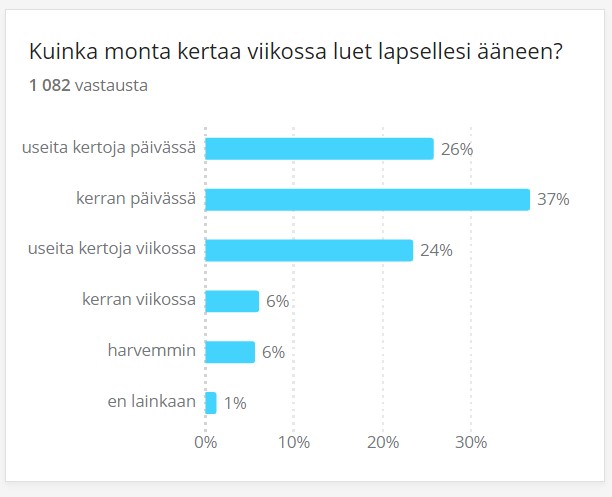
Several times a day
Once a day
Several times a week
Once a week
Less frequently
Not at all
Over half of the parents in the study indicated that they would like maternal and child health care clinics to remind them of the importance of reading and to distribute appropriate books.
What kind of support would you like to support and inspire interest in reading?
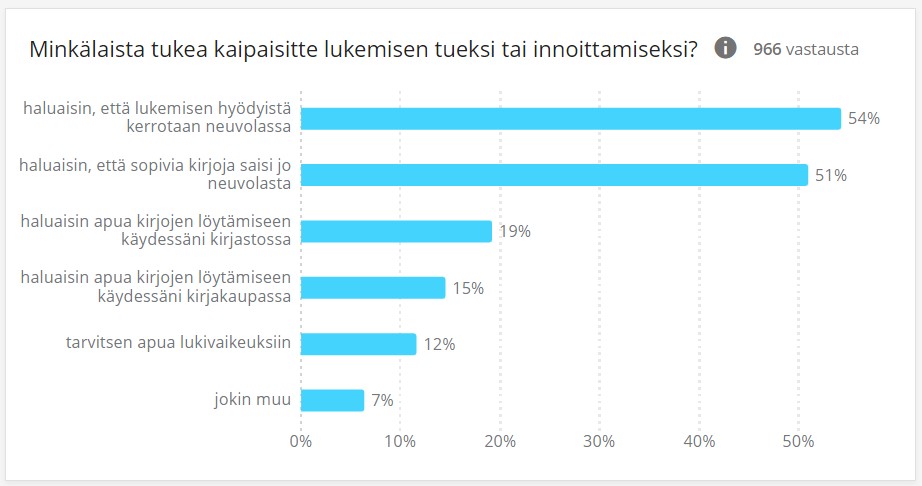
I would like the maternal and child health care clinics to tell me about the benefits of reading
I would like to be able to get appropriate books from my maternal and child health care clinic
I would like help choosing appropriate books at the library
I would like help choosing books in a bookstore
I need help with reading difficulties/dyslexia
Something else
We surveyed public health nurses about their thoughts on early reading before the start of the Read Aloud campaign. Of the survey respondents, 61% said that they have seen a decline in children’s language development.
How has language development in children changed?
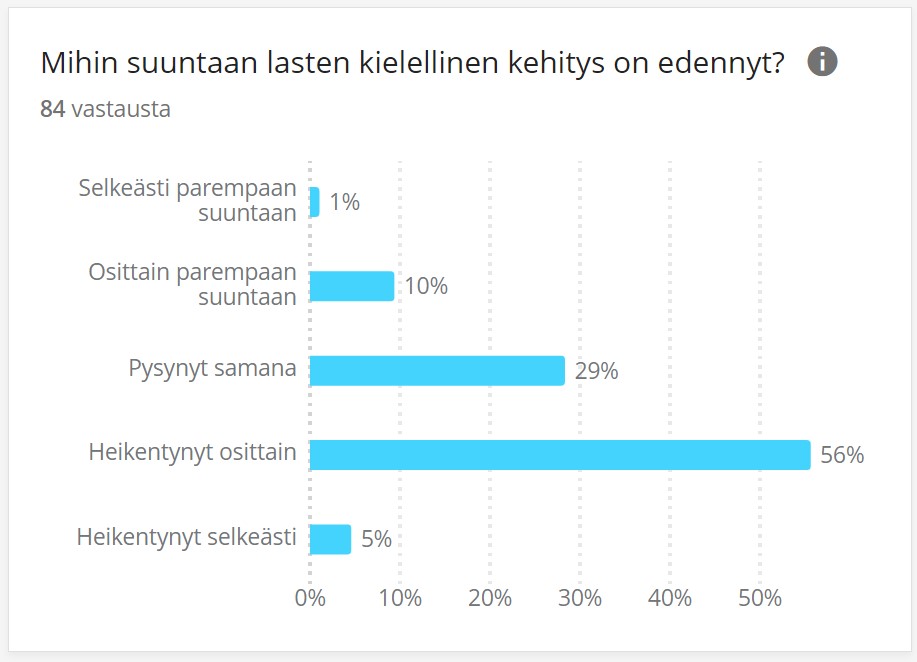
It has clearly improved
It has slightly improved
It has stayed the same
It has declined slightly
It has clearly declined
98% of public health nurses would like to distribute materials and information to support reading in families, and 75% believe that a book bag can have a positive impact on reading habits at home.
Would you like to have inspiring materials to encourage parents to read to their children?
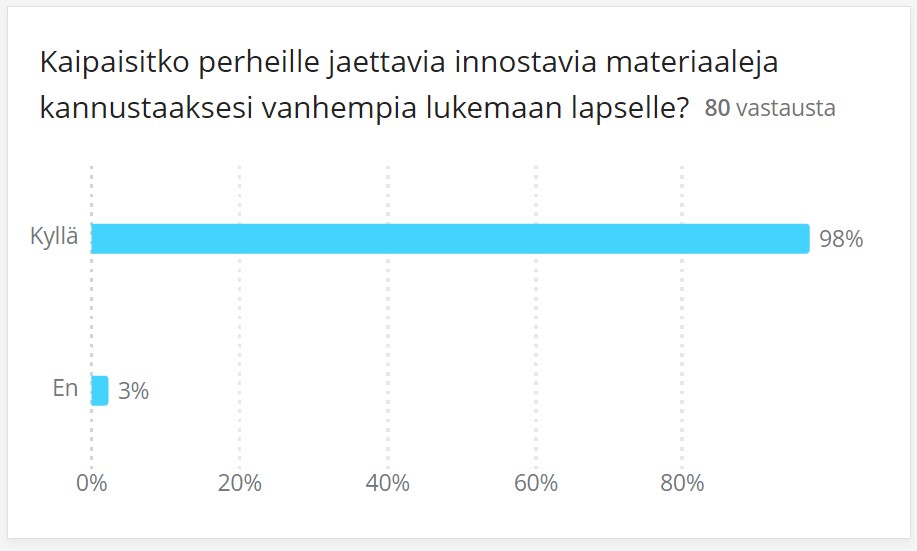
Yes
No
Do you think books distributed in maternal and child health care clinics can encourage more parents to read to their children?
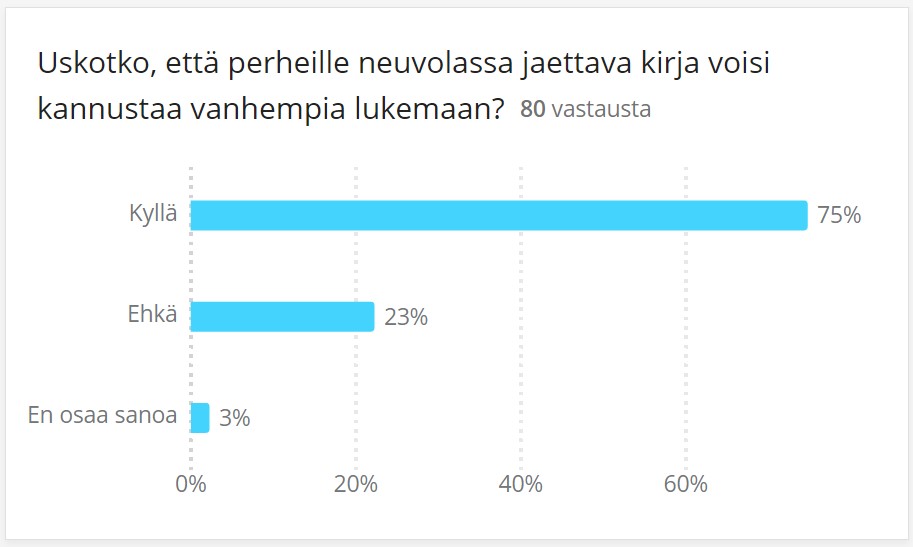
Yes
No
I don’t know
Parents are using the book bag every day
According to our interviews, parents who received a book bag felt that its contents are high quality, topical, and practical. In particular, many parents mentioned they are reading the book of nursery rhymes every day, and they felt the book bag serves as a good reminder for the importance of reading.
Families also hoped that reading could be added to their child’s personal child health care clinic card so reading progress could be monitored at clinic visits.
Public health nurses recognize the value of promoting reading in their work
According to our interviews, public health nurses feel that the book bag supports families with their reading habits. It also offers nurses tools to help remind families of the importance of reading on child development.
Public health nurses said the contents of the book bag support language development and serve as a springboard to reading. Addressing reading is part of a public health nurse’s work, but they are now talking about language development at an even earlier stage with the help of the book bags.
It has been easy for the clinics to participate in the campaign, and distributing the bags has been seen as a positive experience. Public health nurses agree that distributing the bags at their clinics aligns well with their work. Public health nurses have even said that the book bags have made their jobs easier, because being able to offer books as a present helps to begin building positive relationships with their clients.
The book bags also support interaction and closeness between parents and their child. If a parent faces challenges in their interactions with their child, the book bag offers ways to talk about it.
The book bag is suitable for many different families
Public health nurses said the contents of the book bag are positive, diverse, and of high quality. They said it contains a positive array of different topics that suit children of different ages. The books work for different kinds of families, and the contents are also accessible for parents who don’t read. On the whole, public health nurses said the book bag provides high-quality content for many different kinds of families.
All of the parents and public health nurses we interviewed unanimously agreed that the Read Aloud campaign should become permanent. Tuovi Hakulinen, docent and head researcher at the Institute for Health and Welfare is also committed to continuing to work together with the Finnish Reading Center on this program.
Parents need support in their reading habits
According to a survey conducted by the Finnish Reading Center, 63% of Finnish parents feel they read too little to their children. Parents’ attitudes toward reading have also become more negative. The 2017 PIRLS study investigated parents’ attitudes toward reading, and that year, 16% of parents said they liked reading only a little. In 2011, only 9% of parents in the survey responded the same way.
Research shows that a child’s first years of life are critically important when it comes to developing reading and language skills. Babies who are read to experience huge benefits in brain development and learning later on.
Early reading also prevents inequality in reading ability. Children who have had early experiences with reading are better equipped to start school. Among individual hobbies, reading has the greatest effect on a child’s language development, a benefit that puts children ahead of their peers who aren’t read to by almost a year in terms of school readiness. In a study looking at the backgrounds of children entering school, reading appeared as a hobby particularly among highly educated families. That is exactly why it is important to support maternal and child health care clinics in their efforts to promote reading, since they aim to reach out equally to everyone.
Book bag to every baby born -program
Book bag to every baby born is a program with the goal of offering equal opportunities for early reading in all families with babies in Finland. Book bag is given to all the families visiting family health clinics during child’s first year.
The research company Innolink has devised an impact study to study the effects of the book bags on families’ reading habits for the first three-year duration of the program.
Book bag to every baby born -program since 2019 has been prepared and carried out with funding provided by the Finnish Cultural Foundation in the amount of 1.2 million euros. The Finnish Parliament has funded the program since 2022. Program is now included in the government program and has received permanent funding.
A diverse group of experts from different fields worked together on the contents of the book bag. A range of professionals, including children’s book writers, illustrators, researchers, librarians, social workers were involved in putting together the book bag. Tuovi Hakulin, an expert on maternal and child health care clinics and THL’s head researcher, is a key partner. Book bag includes a) a rhyme book b) bedtime story book c) research based information for parents on the importance of reading to your child d) invitation to library.
The book bag is available in Finnish and Swedish. In the future the book bag is planned to be available also in Northern Sami, Inari Sami, Skolt Sami, Ukrainian, Russian, Estonian, Arabic, and Somali.
Why maternity and child health clinics?
The goal is to provide book bags to all families regardless their social or economic background. Maternity and child health care centers are free of charge and easy to reach for clients in every municipality in Finland. Their services are widely used and accepted regardless of social class. It’s even obligatory to visit them to receive financial support. That’s why 99,4 % of families use these services.
In Finland there’s 50 000 children born per year. Families have 8-9 visits during the normal course of a pregnancy and 10 visits during the first year of an infant’s life and once a year after that (1-6 years).
Book bag to every baby born -book bag is available in all Finnish municipalities. Since 2019 Book bag has been given to 93 % od families with babies.